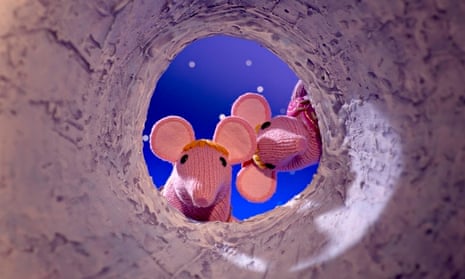When the Clangers return to the BBC on Monday, don’t be fooled by what they look like. Pink and knitted they may be, but the space mice are the latest salvo in a fierce battle for younger viewers between the BBC, Sky, Netflix and beyond, stretching from the TV in the living room to the smartphone in your hand.
Amazon and Netflix have each turned to original production to supplement the thousands of hours of acquired material on their on-demand services. Amazon’s latest six children’s pilots, including Lily the Unicorn, an animated adventure from the Muppets creator the Jim Henson Company, were unveiled last month. At the same time its US rival Netflix, which signed a 300-hour deal with Dreamworks Animation two years ago, announced a further four original animations of its own, including a modern-day take on Tarzan and Jane.
Not be outdone, Sky trumpeted a six-fold increase in its on-demand children’s library, from 700 episodes to 4,000, which it said made it the biggest children’s broadcaster in the UK (while not making any children’s content of its own).
All this at a time when younger viewing is shifting from the TV screen to the handheld one and investment in original children’s content by the UK’s public service broadcasters dipped to a new low. With so much competition for young eyeballs, it is perhaps no surprise that tried and tested hits are revived, such as Clangers and Teletubbies (both on CBeebies), Thunderbirds Are Go on ITV, as well as Inspector Gadget and Danger Mouse (which will air on CBBC), both of which have been bought by Netflix.
Children’s TV viewing, at least in the traditional sense, has been in decline, with viewing on TV sets by four- to 15-year-olds down 22% between the first half of 2010 and the first six months of last year, according to Enders Analysis. At the same time on-demand viewing of children’s programmes has soared, with 342m CBeebies programme requests on the BBC’s iPlayer in 2014, up 29% on the previous year, and 300m CBBC requests, up 21% on 2013.
Sky’s new-look homepage now has one entire section out of eight dedicated to “kids”, a reflection of how the genre has grown in importance alongside the traditional pay-TV battlegrounds of sport, movies and entertainment. Children may not pay the bill, but they know how to pester whoever does.
Stephen van Rooyen, chief marketing and digital officer at Sky, says: “It’s not a response per se to what [Netflix and Amazon] are doing. A big part of our offering since the beginning has been kids and we think the time is right to supersize what we do. Our heartland has always been providing entertainment for families, which is how Sky got going; football is one part, movies another part, but ultimately it’s about providing more choice and staying on top and in front of where our customers’ expectations are.” Backed by new rights deals with US giants such as Viacom and Turner, as well as BBC Worldwide, Sky says it is a response to customer demand for the “convenience of a quick and simple way to access lots of episodes all in one place”.
The BBC’s preschool channel, CBeebies, is relatively isolated from the on-demand invasion, a trusted source of homegrown, advertising-free content where viewing is driven by parents rather than their toddlers. For CBBC, aimed at six- to 12-year-olds, the challenge is more complex, going head to head with all of youngsters’ myriad digital distractions, including video-on-demand, video games and social media. Ofcom research last year said one in three five- to 15-year-olds owned a tablet computer, and six in 10 use one at home.
Former Blue Peter editor Richard Marson, currently making the second series of independent producer TwoFour documentary Our School for CBBC, says on-demand ratings are “dwarfing” traditional viewing figures for some children’s programmes. “People are deluding themselves if they think children will wait until 4.30pm to watch whatever programme it is,” he says. “If they are interested in something, they want to see it immediately or they move on. They are ruthless consumers.”
If there was a case for BBC3 to go online only – the BBC Trust’s verdict is imminent – then the CBBC channel may be next in line, says Marson. “Part of the argument about moving BBC3 online was that the audience was agile and flexible in the way they use content. Actually the CBBC audience is even more agile and flexible. I don’t think it will happen immediately but it is bound to be part of a very serious debate about where they spend their money. What you spend on running a channel is money you can’t spend on content.”
The backdrop to this rush to on-demand is a collapse in investment in homegrown programming, highlighted by producers’ trade body Pact which said spend on children’s content by public service broadcasters had fallen 95% since quotas were removed in 2003. The vast majority of what’s left is spent by the BBC.
“The problem is not about more choice, it’s about too little British programming and not enough origination,” says Pact chief executive John McVay. A newly-introduced tax break might help, but Pact wants media regulator Ofcom to reapply quotas. “ITV and Channel 4 … have effectively exited children’s programming and what’s left is a rump of what they used to do,” says McVay. “We used to rule the world and we have abandoned it.”
Younger viewers have never had it so good. The danger is that the choice may not be as wide as it first seems.

Comments (…)
Sign in or create your Guardian account to join the discussion